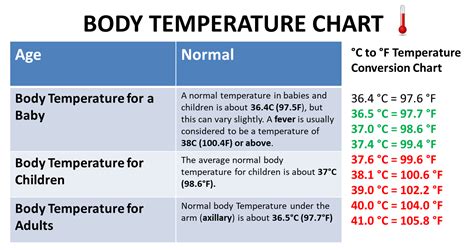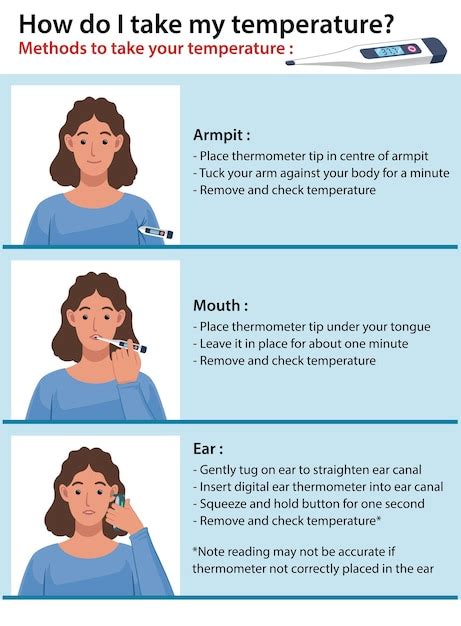Intro
Learn about normal body temperature ranges, factors affecting basal temp, and how to measure accurate core temp, including oral, rectal, and axillary methods for optimal health monitoring and thermal regulation.
The human body is a complex and fascinating system, with many intricate processes working together to maintain our overall health and well-being. One of the most essential aspects of our bodily functions is our body temperature, which plays a crucial role in our daily lives. Normal body temperature is a vital indicator of our health, and any significant deviations from the normal range can signal underlying issues. In this article, we will delve into the world of body temperature, exploring its importance, the factors that influence it, and what constitutes a normal body temperature.
The human body is capable of maintaining a relatively stable temperature, despite changes in the surrounding environment. This is achieved through various physiological mechanisms, such as sweating, shivering, and vasodilation. Our body temperature is regulated by the hypothalamus, a small region in the brain that acts as the body's thermostat. The hypothalamus receives feedback from temperature receptors throughout the body and adjusts our temperature accordingly. This complex process ensures that our body temperature remains within a narrow range, allowing our cells to function optimally.
Maintaining a normal body temperature is essential for our overall health and well-being. Even small deviations from the normal range can have significant effects on our bodily functions. For example, a body temperature that is too high can lead to heat-related illnesses, such as heat exhaustion or heat stroke. On the other hand, a body temperature that is too low can cause hypothermia, a condition that can be life-threatening if left untreated. Furthermore, normal body temperature is also important for our immune system, as it allows our white blood cells to function effectively and fight off infections.
What is Normal Body Temperature?

Normal body temperature is generally considered to be around 98.6°F (37°C). However, it's essential to note that this is only an average value, and normal body temperature can vary slightly from person to person. Factors such as age, sex, and physical activity can influence our body temperature, and it's not uncommon for body temperature to fluctuate throughout the day. For example, body temperature tends to be higher in the late afternoon and evening, and lower in the early morning.
Factors that Influence Body Temperature
There are several factors that can influence our body temperature, including: * Age: Body temperature tends to be higher in children and lower in older adults. * Sex: Women tend to have a slightly higher body temperature than men, especially during the menstrual cycle. * Physical activity: Engaging in strenuous physical activity can raise body temperature, while resting or sleeping can lower it. * Environment: Exposure to extreme temperatures, such as heat or cold, can affect our body temperature. * Medications: Certain medications, such as antibiotics or antipyretics, can influence our body temperature.How to Measure Body Temperature

Measuring body temperature is a simple and straightforward process. There are several methods to measure body temperature, including:
- Oral temperature: This is the most common method, which involves placing a thermometer under the tongue.
- Rectal temperature: This method involves inserting a thermometer into the rectum, which is often used in infants or young children.
- Axillary temperature: This method involves placing a thermometer in the armpit, which is often used in adults.
- Temporal artery temperature: This method involves using a special thermometer to measure the temperature of the temporal artery, which is located on the forehead.
Benefits of Monitoring Body Temperature
Monitoring body temperature can have several benefits, including: * Early detection of illnesses: Changes in body temperature can be an early indicator of underlying illnesses, such as infections or heat-related illnesses. * Prevention of heat-related illnesses: Monitoring body temperature can help prevent heat-related illnesses, such as heat exhaustion or heat stroke. * Optimization of physical performance: Monitoring body temperature can help athletes or individuals optimize their physical performance, as it can affect their endurance and stamina.Abnormal Body Temperature

Abnormal body temperature can be a sign of underlying issues, such as infections, heat-related illnesses, or other medical conditions. There are several types of abnormal body temperature, including:
- Hyperthermia: This is a condition where the body temperature is too high, often above 100.4°F (38°C).
- Hypothermia: This is a condition where the body temperature is too low, often below 95°F (35°C).
- Fever: This is a condition where the body temperature is elevated, often above 100.4°F (38°C), in response to an infection or illness.
Causes of Abnormal Body Temperature
There are several causes of abnormal body temperature, including: * Infections: Bacterial, viral, or fungal infections can cause changes in body temperature. * Heat-related illnesses: Exposure to extreme temperatures, such as heat or cold, can cause heat-related illnesses. * Medications: Certain medications, such as antibiotics or antipyretics, can influence our body temperature. * Medical conditions: Certain medical conditions, such as hyperthyroidism or hypothyroidism, can affect our body temperature.Treatment of Abnormal Body Temperature

Treating abnormal body temperature depends on the underlying cause. In some cases, treatment may involve:
- Medications: Antipyretics, such as acetaminophen or ibuprofen, can help reduce fever.
- Rest and hydration: Getting plenty of rest and staying hydrated can help the body recover from illnesses or heat-related conditions.
- Medical attention: In severe cases, medical attention may be necessary to treat underlying conditions or prevent complications.
Prevention of Abnormal Body Temperature
Preventing abnormal body temperature involves taking steps to maintain a healthy lifestyle, such as: * Staying hydrated: Drinking plenty of fluids can help regulate body temperature. * Avoiding extreme temperatures: Avoiding exposure to extreme temperatures, such as heat or cold, can help prevent heat-related illnesses. * Getting enough rest: Getting plenty of rest and sleep can help the body recover from illnesses or stress.Conclusion and Final Thoughts

In conclusion, normal body temperature is a vital indicator of our overall health and well-being. Maintaining a normal body temperature is essential for our bodily functions, and any significant deviations from the normal range can signal underlying issues. By understanding the factors that influence our body temperature and taking steps to maintain a healthy lifestyle, we can prevent abnormal body temperature and optimize our physical performance. Whether you're an athlete or simply looking to maintain a healthy lifestyle, monitoring your body temperature can have several benefits, from early detection of illnesses to optimization of physical performance.
We invite you to share your thoughts and experiences related to body temperature in the comments section below. Have you ever experienced abnormal body temperature? What steps do you take to maintain a healthy lifestyle and regulate your body temperature? Share your stories and tips with us, and let's work together to promote a healthier and more informed community.
What is the normal range for body temperature?
+Normal body temperature is generally considered to be around 98.6°F (37°C), but it can vary slightly from person to person.
What are the causes of abnormal body temperature?
+Causes of abnormal body temperature include infections, heat-related illnesses, medications, and certain medical conditions, such as hyperthyroidism or hypothyroidism.
How can I prevent abnormal body temperature?
+Preventing abnormal body temperature involves taking steps to maintain a healthy lifestyle, such as staying hydrated, avoiding extreme temperatures, and getting enough rest and sleep.
What are the benefits of monitoring body temperature?
+Monitoring body temperature can have several benefits, including early detection of illnesses, prevention of heat-related illnesses, and optimization of physical performance.
How can I measure my body temperature?
+Measuring body temperature can be done using a thermometer, which can be placed under the tongue, in the rectum, or in the armpit.
